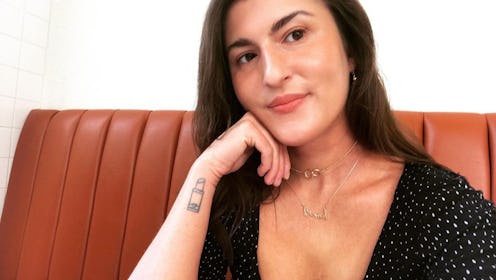Beauty
How Taking Nudes Helped Me Feel Better About My Rare Skin Condition
“I started to realize that my spots and squiggles actually looked quite beautiful in the soft lighting.”

Late one night last March, right at the beginning of lockdown, I received a text message from a guy (a very sweet one, might I add) who I was seeing pretty regularly prior to the pandemic:
“Any chance I can see that beautiful body of yours, babe? I miss it.”
While we’d been sexting on and off for a few months, this was actually the first time he’d asked me for a nude photo, and I wasn’t prepared for it. I knew his intentions were pure, but that wasn’t the problem. Cringing under millennial-pink covers, I wracked my brain for an excuse to type back, all while cursing myself for not taking any nudes when my skin was clear the month before.
I have Netherton syndrome — a super-fun, rare as hell genetic skin condition characterized by red scaly rashes, extreme-level dryness, and a near-constant need to itch. Though I do have fleeting periods of remission, which I cling to like the last minutes of an incredible vacation, it tends to flare up when I’m overwhelmed or stressed. Sure enough, when the pandemic hit and its dumpster fire of uncertainty caused my mental health to spiral, it didn’t take long for my skin to follow suit.
It wasn’t lost on me that sending nudes was becoming more and more popular among my newly sex-deprived peers. Recent research showed a spike in social media mentions of “nudes,” and, according to Buzzfeed, nude-focused subreddits saw a rise in its posts in Feb. 2020. Still, sending a revealing photo of myself was the last quarantine activity on Earth I felt like doing.
Chronic skin conditions in particular can hinder one’s ability to see themselves in a sexual light — hence why I used to get squeamish at the thought of taking a nude photo while my skin was acting up. Plus, one 2017 study found that more than 80% of participants said their skin condition impacted their sexual behavior. Needless to say, I didn’t turn into a confident nude picture-taker overnight. It’s been a long, slow, arduous process of getting to a place where I finally feel comfortable taking sensual photos despite the state of my skin.
All I could see were the ringworm-like squiggles ornamenting my legs and stomach, sticking around like abandoned leftovers that no one liked in the first place.
Things started to shift about two months later when I told my therapist — a psychodermatologist who specializes in the mind-skin connection — how I was feeling about the aforementioned nude request. When I finished venting, he gently presented me with a challenge: to try taking nudes or partial-nudes while focusing on feeling more compassion for my skin. His tip: Actively try to fight off negative thoughts that may crop up in the process, and focus hard on the parts of myself that I love. “Hm, I guess I do really like my butt,” I thought.
The following night, I showered, moisturized from head to toe, and slipped into a satin robe with nothing underneath. I dimmed the lights in my room (mood lighting is everything) and got down to business. It was wholly brutal: All I could see were the ringworm-like squiggles ornamenting my legs and stomach, sticking around like abandoned leftovers that no one liked in the first place. After a few minutes of trying to capture a shot I was happy with in my full-length mirror, I gave up, got stoned, and attempted to erase the futile experience from my brain.
Not long after, LeAnn Rimes posed nude with her psoriasis for Glamour magazine. I decided to give it another try, but this time, as I stared at my spots and squiggles in the mirror, I repeated a mantra to myself: “You are more than your skin.” I began to notice the areas of my skin that were still clear, and I started to realize my spots and squiggles actually looked quite beautiful in the soft lighting, like an abstract work of art you’d see at The Met.
Rimes wasn’t the only one who made me want to give nude-taking another whirl. A whole world of skin condition warriors on Instagram are out there showing off their complexion, spots, scales, and all. Holly Dillon of @getyourskinout, who poses nude all the time and encourages people in the psoriasis community to wear their spots with pride as well, has been especially inspiring.
It’s been a full year, and although I still prefer to take nudes when my skin is totally clear and not feeling itchy or raw, I’ve slowly gotten more comfortable posing in my birthday suit — regardless of how my skin condition is manifesting itself.
Recently, my skin started flaring for the first time in a few months, but it hasn’t stopped me from snapping nudes when the mood strikes. In fact, just last week, I mustered up some confidence and did a whole little photoshoot for myself. Funnily enough, those snaps turned out to be some of the best shots I’ve ever taken, if I do say so myself — and this time, they’re all for me.
Studies referenced:
Barisone, M. (2020). Dermatological diseases, sexuality and intimate relationships: A qualitative meta‐synthesis. Journal of Clinical Nursing. https://onlinelibrary.wiley.com/doi/10.1111/jocn.15375
Tuckman, A. (2017). The Potential Psychological Impact of Skin Conditions. Dermatology and Therapy. https://www.ncbi.nlm.nih.gov/pmc/articles/PMC5289120/